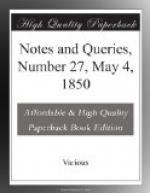Thomas Vernon, author of Vernon’s Reports, was in early life private secretary to the Duke of Monouth, and is supposed to have had a pretty large collection of Monmouth’s correspondence. Vernon settled himself at Hanbury Hall, in Worcestershire, where he built a fine house, and left a large estate. In course of time this passed to an heiress, who married Mr. Cecil (the Earl of Exeter of Alfred Tennyson), and was divorced from him. Lord Exeter sold or carried away the fine library, family plate, and nearly everything curious or valuable that was not an heirloom in the Vernon family. He laid waste the extensive gardens, and sold the elaborate iron gates, which now adorn the avenue to Mere Hall in the immediate neighbourhood. The divorcee married a Mr. Phillips, and dying without surviving issue, the estates passed to a distant branch of her family. About ten years ago I made a careful search (by permission) at Hanbury Hall for the supposed Monmouth MSS., but found none; and I ascertained by inquiry that there were none at Enstone Hall, the seat of Mr. Phillips’s second wife and widow. The MSS. might have been carried to Burleigh, and a friend obtained for me a promise from the Marquis of Exeter that search should be made for them there, but I have reason to believe that the matter was forgotten. Perhaps some of your correspondents may have the means of ascertaining whether there are such MSS. in Lord Exeter’s library. I confess my doubt whether so cautious a man as Thomas Vernon would have retained in his possession a mass of correspondence that might have been fraught with danger to himself personally; and, had it been in the Burleigh library, whether it could have escaped notice. This, however, is to be noted. After Vernon’s death there was a dispute whether his MSS. were to pass to his heir-at-law or to his personal representatives, and the court ordered the MSS. (Reports) to be printed. This was done very incorrectly, and Lord Kenyon seems to have hinted that private reasons have been assigned for that, but these could hardly have related to the Monmouth MSS.
SCOTUS.
* * * * *
PARNELL.
The following verses by Parnell are not included in any edition of his poems that I have seen. {428} They are printed in Steele’s Miscellany (12mo. 1714), p. 63., and in the second edition of the same Miscellany (12mo. 1727), p. 51., with Parnell’s name, and, what is more, on both occasions among other poems by the same author.
TO A YOUNG LADY
On her Translation of the Story of Phoebus and Daphne, from Ovid.
In Phoebus, Wit (as Ovid said)
Enchanting Beauty woo’d;
In Daphne beauty coily fled,
While vainly Wit pursu’d.
But when you trace what Ovid writ,
A diff’rent turn we
view;
Beauty no longer flies from Wit,
Since both are join’d
in you.




